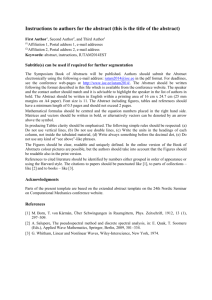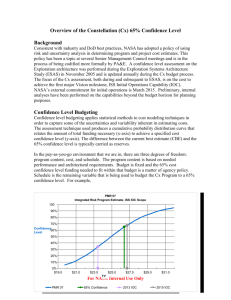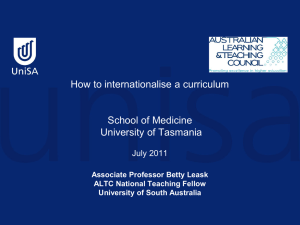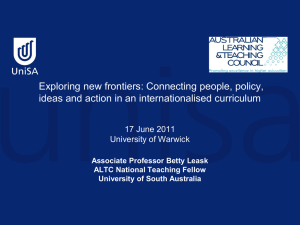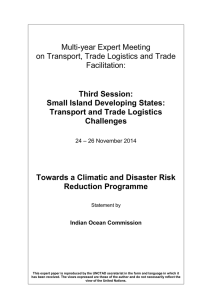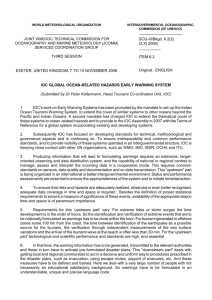INFORMATION DOCUMENT INTERGOVERNMENTAL OCEANOGRAPHIC COMMISSION DRAFT IOC FUND-RAISING STRATEGY
advertisement
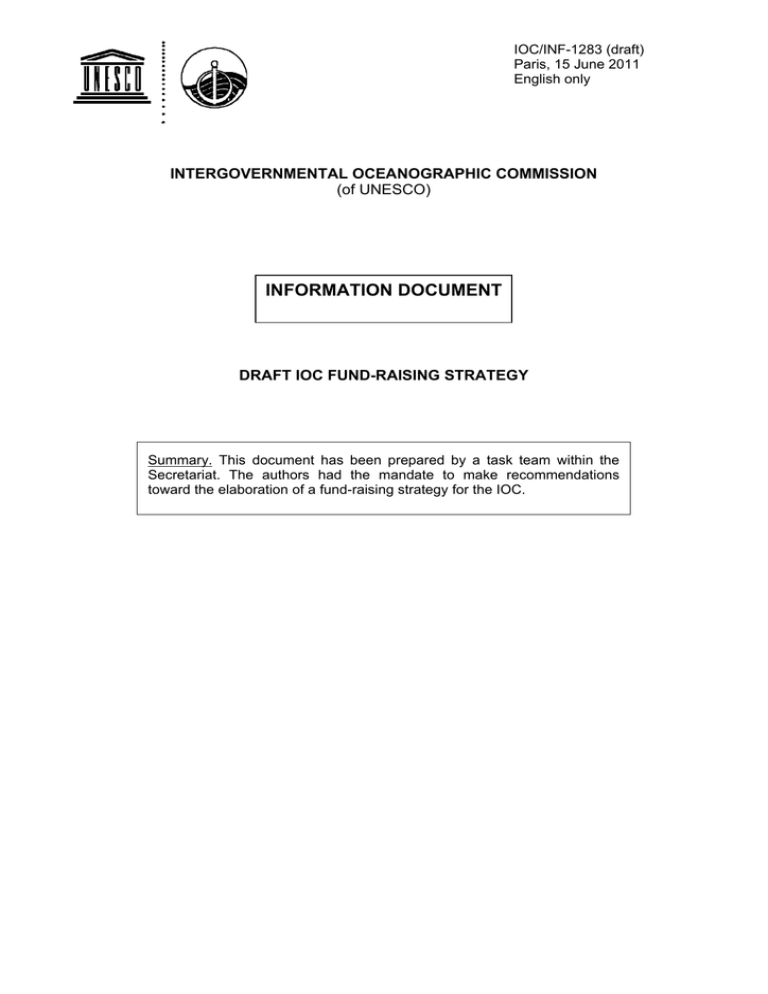
IOC/INF-1283 (draft) Paris, 15 June 2011 English only INTERGOVERNMENTAL OCEANOGRAPHIC COMMISSION (of UNESCO) INFORMATION DOCUMENT DRAFT IOC FUND-RAISING STRATEGY Summary. This document has been prepared by a task team within the Secretariat. The authors had the mandate to make recommendations toward the elaboration of a fund-raising strategy for the IOC. IOC/INF-1283 (draft) 1. Past fundraising – the status quo It is surprisingly difficult to ascertain baseline fundraising level and trends at IOC. Comparable data were available to the Secretariat only for 2008–2010 and are shown in figure 1. Over the past three years IOC has benefitted from three stable and reliable sources of substantial (e.g. over half a million US dollars per year on average) extra budgetary funding: Belgium (Government of Flanders), UN Agencies and the United States. The Flanders support has primarily been in support of IODE including its office in Ostend, Belgium. The UN Agency support has for the most part come from Global Environment Fund (GEF) project proposals generated by the IOC secretariat and funded via GEF Executing Agencies. The US support has been primarily in support of Argo, DBCP, IOCCP and OOPC. There have been three regular and stable secondary (over 250,000 dollars per year on average) contributors to the IOC over this same period: Australia, Japan and ‘Interest and Other’. This third category is important in that it shows that IOC benefits from numerous small (below 50,000 dollars per year on average) donors, whose combined contributions, together with interest on accounts, collectively comprise a significant source of funds. Substantial one-off contributions have occurred about once per year on average, primarily in support of IOC’s tsunami warning system related activities. These include Norway (2008), EC (2009) and Oman (2010). The average IOC extra budgetary to regular budget ratio over the period has been approximately 1.5:1. Because most extra budgetary funds are raised for specific programmes, while regular budget contribution to these same programmes is a small percentage of the IOC regular budget, individual programmes such as IODE, JCOMM, IOCCP and the Tsunami Unit have had stable extra budgetary to regular budget ratios on the order of 10:1 over this three-year period. There is a clear tradeoff between success in raising extra budgetary funds from a limited number of sources and the degree to which programmes are able to reflect the collective direction determined by all IOC Member States through the Assembly or Executive Council. At the 10:1 level it is important that projects take extra care to ensure they are fully responding to collective Member State needs and are governed accordingly. Recommendation 1: Extra budgetary funds raised by IOC should be reported clearly in the IOC Annual Report following a transparent, standard method allowing for proper analysis of baselines and trends over the long term. Figure 1: IOC Main Contributors 2008-2010. Amounts are in US Dollars. Source: IOC Administrative Officer. IOCINF–1283 (draft) – page 2 2. Is the status quo acceptable? The authors of the document noted that extra budgetary support for IOC and its programmes is not limited to funding presented in figure 1, but also includes seconded staff, regional offices directly supported by Member States, and, perhaps most importantly, national contributions to programmes, for example deployments of components of the Global Ocean Observing System. The authors recognized that it did not have reliable information available regarding these other sources of extra budgetary support, but noted that they were substantial. National contributions to programmes, for example, dwarf the accounted extra budgetary funds shown in figure 1 by at least three orders of magnitude. For GOOS these are estimated to be 1 billion dollars per year (source: GOOS summary for policy makers). The authors agreed that the current approach to fundraising is somewhat ad hoc, potentially leading to extra budgetary funding which is most easily obtained rather than that which reflects core IOC priorities as identified by the IOC governing bodies. Fundraising efforts might be improved with new strategic direction on areas where IOC might best focus in pursuit of its mandate, with the understanding that individual professionals should continue to proactively seek out opportunities. 3. Strategy for the Future: 3 Priority Targets On considering the data available, the authors concluded that the first priority target for extra budgetary support should be the IOC Member States, particularly those that are not currently contributing substantial funding. Target countries might include those whose assessed UNESCO contribution levels to the IOC regular budget are substantially higher than their extra budgetary support for IOC. The authors agreed that such Member State support should be sought not as earmarked project funds, but in order to build up an IOC endowment. Once an IOC endowment on the order of 10 million dollars has been achieved, IOC could then use the interest on this sum without drawing on the principal sum. Such a strategy would put governance over the use of the extra budgetary funds in the hands of all IOC Member States, rather than being driven by the priorities of individual donors. The authors recognized that the IOC has not approached private sector donors and foundations systematically in the past and that development of an IOC endowment may be an appropriate vehicle with which to initiate such an approach. The authors agreed that a second priority target would be to enhance host country support of IOC decentralized offices and their associated IOC programmes following the example of Belgium. The IOC offices currently located in Bangkok, Cartagena, Copenhagen, Perth, Toulouse, Rio, Vigo (etc.) have not benefitted over the past three years from the same level of host country support and engagement that Belgium has provided in a sustained manner for the Ostend office and the associated IODE programme. Even if the Belgium/IODE paradigm may not always be achievable, it should be at the very least required that countries which host IOC decentralized offices provide the full operational costs for these offices and explore all possible means to support implementation of associated programmes. Clear adherence to existing or updated guidelines for host country support of IOC decentralized offices would assist in this effort. Finally, the authors recognized past and ongoing successful project oriented extra budgetary fundraising from national sources, such as USA’s NOAA and NSF as well as international sources such as the European Commission and the GEF. As a third priority strategic target the authors recommends continuing and strengthening contacts with these agencies, while broadening efforts to include proposals to additional national and international funding agencies. Lists of government donor agencies and relevant private sector foundations prepared by the secretary for IOCARIBE are available to facilitate this effort. Recommendation 2: IOC should explore the establishment of an endowment including by approaching IOC Member States and the private sector. Intergovernmental Oceanographic Commission (IOC) United Nations Educational, Scientific and Cultural Organization 1, rue Miollis, 75 732 Paris Cedex 15, France Tel.: +33 1 45 68 10 10 Fax: +33 1 45 68 58 12 http://Ioc.unesco.org

